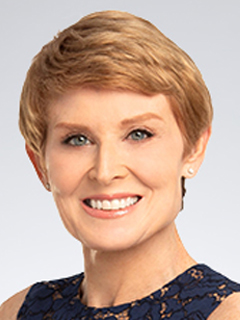Webcast overview
Oversight amid an economic transition
While the U.S. continued to see growth through the fourth quarter of 2022, KPMG Chief Economist Diane Swonk cautioned corporate directors that volatility on the horizon will require “more cooperation rather than less” between and among businesses and consumers, companies and governments, and countries as the economy transitions to tackle inflation, slowing growth, and higher interest rates.
Speaking on a January 19 webcast with John Rodi, Leader, KPMG Board Leadership Center, Swonk discussed the following three factors for directors to be mindful of as they keep an eye on the macro economy.
Resilience: After a significant downturn in the early days of the pandemic, the economy returned to its prior peak “and then some,” said Swonk. Even as inflation surged last year, consumer spending remained resilient. By the fourth quarter of 2022, however, there was a “chill in retail sales,” business investment and manufacturing activity was receding, and housing had been down since the second quarter. Ultimately, Swonk said, a mild recession in the first half of 2023 could bring “green shoots by the end of the year.” Resilience requires companies to figure how to grow while being “limited by structural change in the labor market.” Swonk believes that laid-off workers in the technology sector will get jobs in other industries and help disseminate their expertise across the economy. In fact, less than 10 percent of directors surveyed for the webcast saw cost-cutting as their top concern, focusing instead on liquidity and cash flows. (See full survey results below.)
Find the latest Economic Compass and Chartbook at KPMG Economics.
Risk: A trio of factors from geopolitical tensions to climate change, including a surge in the number of extreme weather events, and aging demographics has made the global economy more susceptible to supply shocks. “Bouts of inflation and rate hikes are likely to be more common in the post-pandemic world,” said Swonk, but the economy is more responsive to rate cuts than it once was, which means it is easier to stimulate and reflate. That is why the Federal Reserve is erring on the side of overshooting rather than undershooting when it comes to rate hikes. Swonk sees the U.S. Federal Funds rate peaking at 5.25 percent in order to push inflation below 3 percent, and half of directors surveyed prior to the webcast saw inflation and rates as the greatest risk to the U.S. economy over the next 12 to 18 months. On the back of more than two years of highly accommodative fiscal and monetary policy, “inventories got bloated after being drained [during the pandemic] and now need to be drained again.” Still, Swonk noted that supply chains are reshuffling as “breaking up with China is very hard to do.” “It matters who you are doing business with and where,” said Swonk, “even if that adds more friction to supply chains.”
Talent: “It’s hard to know where we are, let alone forecast where we’re going,” said Swonk, but U.S. companies won’t be able to move forward without humility and the acknowledgement that millennials and Gen Z are the “most diverse and most educated generation” in the workforce today. “Diversity aids in decision-making,” said Swonk, but added that management and boards need to expand their scope in order to accommodate a wider talent pool. “How are we addressing those who are still working at home? What about underrepresented minorities? If you don’t lean in, you can’t meet your diversity, equity, and inclusion (DEI) commitments,” said Swonk. Moreover, workforce participation and education rates for men are declining. “We need all hands on-deck” to be competitive, she said.
Webcast survey results*
As risk of recession looms in the United States, what will be the top area of focus or concern for your board(s)?
33% Liquidity/access to capital/cash flow
31% Scenario planning
16% Capital allocation
9% Cost cutting
3% Third party exposure
3% Fair value/asset impairments
3% Hedging (commodities, currencies, interest rates)
2% Other
In your view, what is the greatest risk to the health of the U.S. economy over the next 12–18 months?
50% Inflation/interest rates
19% Geopolitical tensions
11% U.S. political gridlock
6% Employment trends/consumer spending power
4% Federal deficit
3% Supply chain delays
2% Climate severity
1% Trade barriers/tariffs
3% Other
*Among 679 self-identified corporate directors surveyed in advance of the January 19, 2023, KPMG Board Leadership Center webcast.




